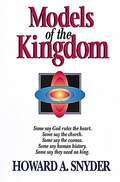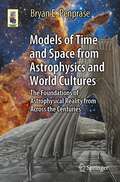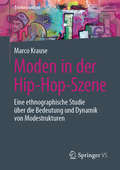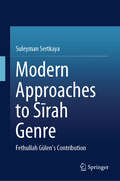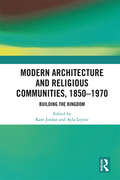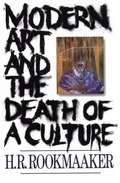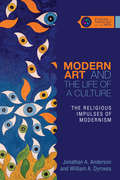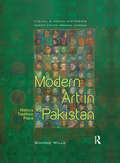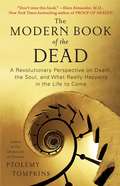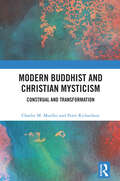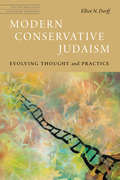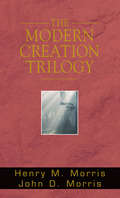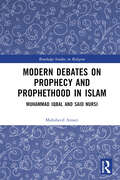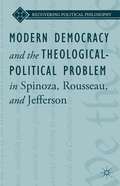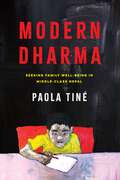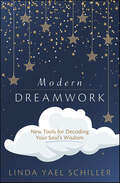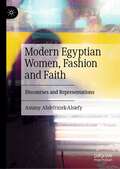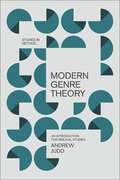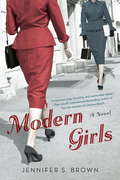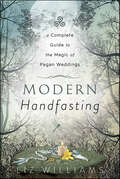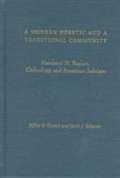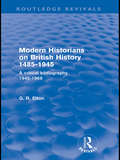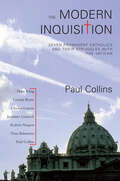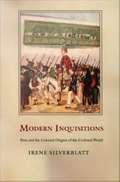- Table View
- List View
Models of the Kingdom
by Howard Snyder"Christians often misunderstand one another when they refer to the kingdom of God. They may ask: 'Is it here on earth? In our hearts? In our churches?' Over the years, best-selling author Howard Snyder has been helping pastors and church leaders understand kingdom terminology. Now he explains in eight models how the kingdom or reign of God has been and may be conceived. Snyder explains with biblical texts and illustrations from church history. If you are a pastor or church leader, you will find guidance for building new kingdom communities in your congregation as well as ways to relate kingdom theology to global crises with the environment and our economy."
Models of Time and Space from Astrophysics and World Cultures: The Foundations of Astrophysical Reality from Across the Centuries (Astronomers' Universe)
by Bryan E. PenpraseModels of Time and Space from Astrophysics and World Cultures explores how our conceptions of time, space, and the physical universe have evolved across cultures throughout the centuries. Developed with a humanistic approach, this book blends historical sources, biographical profiles of exceptional scientists, and the latest discoveries in both astrophysics and particle physics. This rich read describes the incredible insights and ultimate limits of our knowledge, the physical universe, and how ideas old and new have converged, across the world, to build our current understanding of reality. From the Large Hadron Collider to the James Webb Space Telescope, we have mapped the universe from the smallest to largest scales; allowing us to gain fundamental knowledge that has transformed our understanding of the universe. The chapters herein will teach you about dark matter and dark energy, gravitational waves and other complex parts of the cosmos. Along the way, you will learn a thing or two about quantum mechanics, parallel universes, and the ultimate boundaries of the observable universe. This book cultivates insight from a variety of cultural traditions, including perspectives from both modern and ancient cultures, in order to show how our modern conceptions of space and time have arisen from the ongoing explorations within ancient world civilizations.It is a valuable, intriguing and insightful volume for those interested in the fields of historical astronomy and cultural astronomy, as well as for anyone interested in learning about the latest finds from the field of physics and astrophysics.
Moden in der Hip-Hop-Szene: Eine ethnographische Studie über die Bedeutung und Dynamik von Modestrukturen (Erlebniswelten)
by Marco KrauseDiese Arbeit widmet sich dem Thema der szenespezifischen Moden. Der Kern dieser Forschungsarbeit besteht daraus, anhand einer ethnographischen Studie das szenespezifische Modephänomen im Kontext der Hip-Hop-Szene in seinen Strukturen abzubilden und dessen Facetten, Bedeutungen und Differenzierungen aufzudecken, um daran anknüpfend aufzuzeigen, welche Produkte beziehungsweise Produkteigenschaften die Szene-Mitglieder als Mode deklarieren und konsumieren und welchen Stellenwert dieses Phänomen innerhalb der Szene einnimmt. Die übergreifende Zielstellung bildet dabei die Generierung eines differenzierteren Betrachtungsansatzes des Modephänomens, welcher auf die Vergemeinschaftungsform der Hip-Hop-Szene bezogen ist und deren innere Strukturen und Facetten berücksichtigt.Der InhaltForschungsstand: Moden und Szenen • Forschungsstand: Hip-Hop-Szene • Forschungsdesign • Konsumrelevante Werte, Strukturen und Relationen in der Hip-Hop-Szene • Produktkonsum in der Hip-Hop-Szene • Moden in der Hip-Hop-SzeneDer AutorMarco Krause ist Soziologe mit Fokus auf den Bereich Konsumsoziologie und Consultant im Bereich Digital Intelligence.
Modern Approaches to Sīrah Genre: Fethullah Gülen’s Contribution
by Suleyman SertkayaThis book offers a comparative analysis of contemporary approaches to the sīrah genre (biography of Prophet Muhammad). It explores the connection and juxtaposition of the sīrah genre with Islamic systematic theology (kalām), particularly in the context of the emergence of Islamic modernism. It also highlights the inherent interconnectedness of the sīrah and kalām disciplines. The book presents a careful study of Fethullah Gülen&’s reading and interpretation of the sīrah within the broader framework of modern debates, investigating his approach through the lens of the kalām discipline and the philosophy of sīrah. The author argues that reading the sīrah from the perspective of the kalām discipline, kalāmisation of sīrah, is a novel response to modern debates around the life of Prophet Muhammad. Kalāmisation of sīrah together with the notion of sīrah philosophy, represents a significant advancement in the field, providing new methodological and interpretative frameworks that are likely to define future trajectories of sīrah writings. Gülen&’s contributions are both ground-breaking and forward-looking, offering novel ways to engage with and understand the sīrah for a contemporary audience. This book is an essential resource for scholars and researchers in Islamic studies, theology, philosophy of religion, religious movements, and literature.
Modern Architecture and Religious Communities, 1850-1970: Building the Kingdom
by Kate Jordan Ayla LepineSocial groups formed around shared religious beliefs encountered significant change and challenges between the 1860s and the 1970s. This book is the first collection of essays of its kind to take a broad, thematically-driven case study approach to this genre of architecture and its associated visual culture and communal experience. Examples range from Nuns’ holy spaces celebrating the life of St Theresa of Lisieux to utopian American desert communities and their reliance on the philosophy of Teilhard de Chardin. Modern religious architecture converses with a broad spectrum of social, anthropological, cultural and theological discourses and the authors engage with them rigorously and innovatively. As such, new readings of sacred spaces offer new angles and perspectives on some of the dominant narratives of the nineteenth, twentieth and twenty-first centuries: empire, urban expansion, pluralism and modernity. In a post-traditional landscape, religious architecture suggests expansive ways of exploring themes including nostalgia and revivalism; engineering and technological innovation; prayer and spiritual experimentation; and the beauty of holiness for a brave new world. Shaped by the tensions and anxieties of the modern era and powerfully expressed in the space and material culture of faith, the architecture presented here creates a set of new turning points in the history of the built environment.
Modern Art and the Death of a Culture
by H. R. RookmaakerThis disturbing but illuminating classic is a brilliant perspective on the cultural turmoil of the radical sixties and its impact on today's world, especially as reflected in the art of the time. Rookmaaker's enduring analysis looks at modern art in a broad historical, social, and philosophical context, laying bare the despair and nihilism that pervade our era. He also shows the role Christian artists can play in proclaiming truth through their work.
Modern Art and the Life of a Culture: The Religious Impulses of Modernism (Studies in Theology and the Arts #Coming In May)
by William A. Dyrness Jonathan A. AndersonChristianity Today's 2017 Book of the Year Award of Merit - Culture and the Arts For many Christians, engaging with modern art raises several questions: Is the Christian faith at odds with modern art? Does modernism contain religious themes? What is the place of Christian artists in the landscape of modern art? Nearly fifty years ago, Dutch art historian and theologian Hans Rookmaaker offered his answers to these questions when he published his groundbreaking work, Modern Art and the Death of a Culture, which was characterized by both misgivings and hopefulness. While appreciating Rookmaaker's invaluable contribution to the study of theology and the arts, this volume—coauthored by an artist and a theologian—responds to his work and offers its own answers to these questions by arguing that there were actually strong religious impulses that positively shaped modern visual art. Instead of affirming a pattern of decline and growing antipathy towards faith, the authors contend that theological engagement and inquiry can be perceived across a wide range of modern art—French, British, German, Dutch, Russian and North American—and through particular works by artists such as Gauguin, Picasso, David Jones, Caspar David Friedrich, van Gogh, Kandinsky, Warhol and many others. This book, the first in IVP Academic's new Studies in Theology and the Arts series, brings together the disciplines of art history and theology and points to the signs of life in modern art in order to help Christians navigate these difficult waters.
Modern Art in Pakistan: History, Tradition, Place (Visual and Media Histories)
by Simone WilleModern Art in Pakistan examines interaction of space, tradition, and history to analyse artistic production in Pakistan from the 1950s to recent times. It traces the evolution of modernism in Pakistan and frames it in a global context in the aftermath of Partition. A masterful insight into South Asian art, this book will interest researchers, scholars, and students of South Asian art and art history, and Pakistan in particular. Further, it will be useful to those engaged in the fields of Islamic studies, museum studies, and modern South Asian history.
The Modern Book of the Dead: A Revolutionary Perspective on Death, the Soul, and What Really Happens in the Life to Come
by Ptolemy TompkinsA modern exploration of what happens after death, uniting spirituality with philosophy, biology, neuroscience, and rich examples of afterlife experiences. What happens to us after we die? It remains perhaps the single most important question we can ask, one that still inspires thousands to turn to the Tibetan and Egyptian Books of the Dead for hope and comfort. But we can no longer rely solely on ancient wisdom for truly useful answers about our own mortality. We must find explanations for the afterlife in the fruits of modern experience. Critically acclaimed author Ptolemy Tompkins grew up in a family where questions about the shape and fate of the human soul were discussed on a daily basis, but it was only after his father’s passing that he began to consider death in a genuinely concrete way. In this boldly unconventional book—part memoir, part history of ideas, part road map to what might truly await us—Tompkins approaches the question of the afterlife with refreshing intimacy. Weaving together philosophy, science, stories of near-death experiences, and theology, he offers readers a new perspective on death and comes to an amazing and uplifting conclusion: that, somehow, human consciousness lives on.
Modern Buddhist and Christian Mysticism: Construal and Transformation
by Charles M. Mueller Peter RichardsonInvestigations of mysticism often focus on the past while largely ignoring current developments.This book contributes to a reversal of that trend with a rigorous examination of a wide selection of contemporary Buddhist and Christian authors. The focus is on the intriguing intersections and subtle divergences now emerging in areas such as ineffability, nonconceptuality, paradox, inverted agency, unity, and self-dissolution. The analysis combines the theoretical framework of Cognitive Linguistics with a range of methodological approaches, from discourse and thematic analysis to corpus linguistics.Wide-ranging, systematic, and informative, the book is invaluable to all of those interested in the phenomenon of mysticism within the modern world.
Modern Challenges to Islamic Law (Law in Context)
by Shaheen Sardar AliThe diversity of interpretation within Islamic legal traditions can be challenging for those working within this field of study. Using a distinctly contextual approach, this book addresses such challenges by combining theoretical perspectives on Islamic law with insight into how local understandings impact on the application of law in Muslim daily life. Engaging with topics as diverse as Islamic constitutionalism, Islamic finance, human rights and internet fatawa, Shaheen Sardar Ali provides an invaluable resource for scholars, students and practitioners alike by exploring exactly what constitutes Islamic law in the contemporary world. Useful examples, case studies, a glossary of terms and the author's personal reflections accompany traditional academic critique, and together offer the reader a unique and discerning discussion of Islamic law in practice. Considers the realities of Islamic law in day-to-day life so as to engage readers across cultures, geographies and knowledge systems. Includes relevant examples, case studies and a glossary alongside academic critique, creating a well-rounded resource useful for the introductory student market. Explores the diversity of interpretations within Islamic legal traditions, leading readers to a rich understanding of this complex subject area.
Modern Conservative Judaism: Evolving Thought and Practice (JPS Anthologies of Jewish Thought)
by Rabbi Elliot N. Dorff Rabbi Julie SchonfeldA major Conservative movement leader of our time, Elliot N. Dorff provides a personal, behind-the-scenes guide to the evolution of Conservative Jewish thought and practice over the last half century. His candid observations concerning the movement’s ongoing tension between constancy and change shed light on the sometimes unified, sometimes diverse, and occasionally contentious reasoning behind the modern movement’s most important laws, policies, and documents. Meanwhile, he has assembled, excerpted, and contextualized the most important historical and internal documents in modern Conservative movement history for the first time in one place, enabling readers to consider and compare them all in context. In “Part 1: God” Dorff explores various ways that Conservative Jews think about God and prayer. In “Part 2: Torah” he considers different approaches to Jewish study, law, and practice; changing women’s roles; bioethical rulings on issues ranging from contraception to cloning; business ethics; ritual observances from online minyanim to sports on Shabbat; moral issues from capital punishment to protecting the poor; and nonmarital sex to same-sex marriage. In “Part 3: Israel” he examines Zionism, the People Israel, and rabbinic rulings in Israel.
The Modern Creation Trilogy
by Dr Henry M. Morris Dr John D. MorrisUtterly fascinating, The Modern Creation Trilogy is the definitive work on the subject, and a must for anyone interested in the study or origins. Read about the easy capitulation by theologians confronted with Charles Darwin's evolutionary theories, or the mysterious Babylonian creation story, Enuma Elish. Find out what the Bible says about dinosaurs, Noah's flood, and Christ's firm acknowledgement of the importance of Genesis. This project covers all the bases, and as a beautifully bound set, makes the perfect gift for believers and even unbelievers. Volume One: Scripture & Creation - 232 pages - Evidences found throughout the Bible for special creation. Volume Two: Science & Creation - 343 pages - Examines only the scientific facts. Volume Three: Society & Creation - 208 pages - The effects on society of a pervasive evolutionary philosophy. 3 Vol gift-boxed set * Free CD-Rom
Modern Debates on Prophecy and Prophethood in Islam: Muhammad Iqbal and Said Nursi (Routledge Studies in Religion)
by Mahsheed AnsariWhile prophethood is the backbone of the Islamic tradition and an uncompromised tenet of faith, the impact of modernity with its ambivalent status afforded to the prophet and institution of prophethood shook many Muslim scholars. Through analysis of these modern debates on prophethood in Islam, this book situates Muhammad Iqbal’s (1877–1938) and Said Nursi’s (1877–1960) discourses within it and assesses their implications on the modern period. This book introduces the "what, who and how" of the prophets in the Islamic tradition. It unveils the rich Islamic literature of both the classical and modern periods and analyses the construction of their philosophies and theologies. Concise in both historical and textual analyses, this book makes an important contribution to our understanding of contemporary debates on prophecy and prophethood in Islam and will be of great interest to postgraduate students and researchers of Islam, religious studies, medieval studies and contemporary studies of Islam and religion.
Modern Democracy and the Theological-Political Problem in Spinoza, Rousseau, and Jefferson
by Lee WardThis study examines the intersection of two philosophical developments that arguably have come to define contemporary life in the liberal democratic west. First, it considers how democracy has transformed historically from being one among several plausible forms of government into the only legitimate and publicly defensible regime. Second, it considers how modern democracy attempts to solve what has been called the 'theological-political problem, ' that is, the competing claims to rule grounded in conflicting appeals to reason and revelation, by determining that consent of the people would replace divine authorization as the source of political authority. Understanding the emergence of modern democracy requires examining the manner in which democratic political thinkers, most importantly Benedict Spinoza, Jean-Jacques Rousseau, and Thomas Jefferson re-conceptualized the traditional understanding of the relation between politics and religion. This book will show that Spinoza, Rousseau and Jefferson were the three who made the democratic west we know today.
Modern Dharma: Seeking Family Well-Being in Middle-Class Nepal
by Paola TinéHow middle-class families in Nepal pursue “well-being” in a rapidly changing social landscapeModern Dharma asks how middle-class Nepalis pursue an ethical, good life in a rapidly evolving society. In the aftermath of a decade-long civil war that raged between 1996 and 2006, social change accelerated in Nepal as the shift to a market economy and the spread of education and media built the foundation for a new middle class to form. As it did, tension built between the expression of individual will and the expectation to submit to traditional social hierarchies. Today, people in Nepal are confronted by the need to restructure moral codes and to care for their families, while at the same time, they face intense pressure to keep up with the cost of education and to find work in an increasingly competitive labor market. Amidst these changes, people often describe their choices as falling under the broader goal of pursuing well-being.Modern Dharma investigates how and why—amidst often conflicting priorities—people make choices in pursuit of well-being. Anthropologist Paola Tiné investigates why many large families separate into smaller nuclei, while others maintain intra-generational homes. She asks why and how young people seek the support of their friends, while often hiding private desires from their parents. And she investigates the ways that marriage choices and friendship relationships help people navigate the ongoing tangible difficulties engendered by socioeconomic change. By delving into the intricacies of domestic lives among a growing middle class, Modern Dharma works to center the household and kinship relationships as the places where broader global transitions are reflected, resisted, and negotiated. Providing a new perspective on moral personhood in South Asia, this book ultimately sheds new light on the centrality of kinship relationships in initiating and shaping social change.
Modern Dreamwork: New Tools for Decoding Your Soul's Wisdom
by Linda Yael SchillerPurpose, healing, and creative insights through dream interpretationModern Dreamwork is a hands-on guide to interpreting your dreams so you can work through difficult issues with the wisest parts of your soul. The Integrated Embodied Approach incorporates physical sensations, images, associations, and emotions for rich, holistic interpretations. The PARDES Method focuses on multiple layers of meaning so you can untangle complex or confusing dreams. The Guided Active Imagination Approach works with Jungian psychology, creating safety and support for working with frightening dreams and nightmares.The methods and techniques in this book can be used by anyone, regardless of spiritual background. Whether you're facing a difficult life choice, working through emotionally challenging experiences, or are just plain curious about what your dreams are trying to tell you, Modern Dreamwork will help you understand the deep wisdom of your subconscious mind.
Modern Egyptian Women, Fashion and Faith: Discourses and Representations
by Amany Abdelrazek-AlsiefyThis book discusses Egyptian Muslim women’s dress as the social, political and ideological signifier of the changing attitudes towards Western modernity. It employs women’s clothing styles as a feminist act that provides rich insights into the power and limits of legal regulations and hegemonic discourses in constructing gendered and cultural borders in the modern Egyptian public sphere. Furthermore, through highlighting marginalized but significant models and historical moments of cultural exchange between Muslim and Western cultures through female dress, the book tells a third story beyond the binary model of an assumed modest oppressed traditional Muslim woman vis-à-vis consumer emancipated modern Western woman in mainstream Western discourse and literary representation.
Modern Genre Theory: An Introduction for Biblical Studies
by Andrew JuddHow a better understanding of genre leads to a better understanding of the biblical text.The Bible, with its gloriously rich diversity of ancient genres, demands a flexible and historically aware approach to genre. Different conceptions of narrative, poetry, gospel, epistle, wisdom, and apocalyptic texts lead to vastly different readings, and our disagreements about what the Bible means often boil down to different assumptions about what the biblical text is. As secular genre theory has experienced a recent renaissance, biblical studies has been left in the dark ages of rigid taxonomies and stubborn essentialism.The Bible deserves better.This book offers students in biblical studies an accessible but comprehensive introduction to modern genre theory, providing access to literary tools for understanding how writers and readers use genre to make meaning.Modern Genre Theory describes the current state of biblical genre theory (as well as the meaning of form criticism and why it needs to die). Scholar of biblical hermeneutics Andrew Judd then presents a better alternative of interpretation based on the best developments in secular literary theory, linguistics, and rhetorical studies.Drawing on advancements in modern genre theory, Judd:Proposes a working definition of genre for biblical studies.Identifies twelve tenets of modern genre theory that follow from seeing genres in their historical and social context.Offers eight case studies in biblical exegesis to show how a better understanding of genre leads to a better understanding of the Bible. From the creation accounts of Genesis to the visions of Revelation, it is important to get a handle on genre. This book offers a way to reading the Bible better.
Modern Girls
by Jennifer S. BrownA dazzling debut novel set in New York City's Jewish immigrant community in 1935... How was it that out of all the girls in the office, I was the one to find myself in this situation? This didn't happen to nice Jewish girls. In 1935, Dottie Krasinsky is the epitome of the modern girl. A bookkeeper in Midtown Manhattan, Dottie steals kisses from her steady beau, meets her girlfriends for drinks, and eyes the latest fashions. Yet at heart, she is a dutiful daughter, living with her Yiddish-speaking parents on the Lower East Side. So when, after a single careless night, she finds herself in a family way by a charismatic but unsuitable man, she is desperate: unwed, unsure, and running out of options. After the birth of five children--and twenty years as a housewife--Dottie's immigrant mother, Rose, is itching to return to the social activism she embraced as a young woman. With strikes and breadlines at home and National Socialism rising in Europe, there is much more important work to do than cooking and cleaning. So when she realizes that she, too, is pregnant, she struggles to reconcile her longings with her faith. As mother and daughter wrestle with unthinkable choices, they are forced to confront their beliefs, the changing world, and the fact that their lives will never again be the same....
Modern Handfasting: A Complete Guide to the Magic of Pagan Weddings
by Liz WilliamsEverything You Need to Plan Your Pagan WeddingHandfasting is quickly becoming a widely practiced tradition, not only for pagans, but for people from all walks of life. This book is a thorough resource that shares rituals, sample vows, and all the information you need to plan your own ceremony or serve as a celebrant for others.In Modern Handfasting, you will discover the history, legal considerations, logistics, and magic of the big day. Author Liz Williams—a priestess and longtime celebrant—guides you through writing your vows, opening the ceremony, creating and consecrating a circle, calling the quarters, tying the knot, and closing the ceremony. You will also discover tips and stories from other couples and celebrants as well as practical information on early planning, troubleshooting unexpected problems, finding a celebrant, and performing love magic. Learn how to choose flowers, dates, and other details with magical correspondences.
A Modern Heretic and a Traditional Community: Mordecai M. Kaplan, Orthodoxy, and American Judaism
by Jeffrey S. Gurock Jacob J. SchacterEncompasses more than previous autobiographies of Kaplan (1881-1983) by considering at length the community he came from, lived in, fought with, and left behind. Follows him from his early days as a member in good standing in the New York Orthodox Jewish community, through his private estrangement and public divorce from Orthodoxy, to his founding of Reconstructionism and many decades as the movement's leader. Queries whether a religious group can learn anything from one of its members who has rejected its most fundamental beliefs. Annotation c. by Book News, Inc., Portland, Or.
Modern Historians on British History 1485-1945: A Critical Bibliography 1945-1969 (Routledge Revivals)
by G.R. EltonThe twenty-five year period following the Second World War saw an enormous expansion of activity in the writing of the history of modern Britain, and with that expansion a major transformation of the state of knowledge in many parts of the area. First published in 1970, this Revivals reissue, which includes an extensive coverage of books and a reasonable selection of articles, endeavours both to survey the work done and to reduce it to some comprehensible order. It indicates achievements and probable lines of development, and collects the materials that have grown around the main controversies. Omitted are local history (in the main) and the history of empire and commonwealth, except where the latter really arises out of the affairs of the mother country. There are special sections on social history, the history of ideas, Scotland and Ireland.
The Modern Inquisition: Seven Prominent Catholics and Thier Struggle with the Vatican
by Paul CollinsThe Inquisition ceased burning and torturing heretics in the 18th century; A milder punishment awaits the dissidents today, principally excommunication or banishment from official teaching positions. Paul Collins has discovered- through his own experience and extensive research that the impact of the Vatican's investigations, through the Congregation for the Doctrine of the Faith, can be quite profound. Collins is the controversial Australian Catholic priest recently investigated by the Vatican for alleged heresy. He served the Church for 33 years and is generally esteemed for his dry wit and his ability to make his vocation accessible a trait many appreciated in an increasingly secular world. The Vatican, however, views Collins's less than reverential views as heretical and has been investigating him since 1997, when Collins' book Papal Power was singled out for supposed "doctrinal problems."The Modern Inquisition, compiled over the four years that the mysterious and secretive CDF deliberated on Collins' work, brings together the stories of others who have also been pursued, condemned, or vilified by the CDF. Here are seven fascinating accounts of how the modern Inquisition operates what it is like to be accused by anonymous informers, investigated in secret, and tried at arms length with no recourse to appeal.
Modern Inquisitions: Peru and the Colonial Origins of the Civilized World
by Irene SilverblattTrying to understand how "civilized" people could embrace fascism, Hannah Arendt searched for a precedent in modern Western history. She found it in nineteenth-century colonialism, with its mix of bureaucratic rule, racial superiority, and appeals to rationality. Modern Inquisitions takes Arendt's insights into the barbaric underside of Western civilization and moves them back to the sixteenth century and seventeenth, when Spanish colonialism dominated the globe. Irene Silverblatt describes how the modern world developed in tandem with Spanish imperialism and argues that key characteristics of the modern state are evident in the workings of the Inquisition. Her analysis of the tribunal's persecution of women and men in colonial Peru illuminates modernity's intricate "dance of bureaucracy and race. " Drawing on extensive research in Peruvian and Spanish archives, Silverblatt uses church records, evangelizing sermons, and missionary guides to explore how the emerging modern world was built, experienced, and understood by colonists, native peoples, and Inquisition officials: Early missionaries preached about world history and about the races and nations that inhabited the globe; Inquisitors, able bureaucrats, defined who was a legitimate Spaniard as they executed heretics for "reasons of state"; the "stained blood" of Indians, blacks, and descendants of Jews and Moors was said to cause their deficient character; and native Peruvians began to call themselves Indian. In dialogue with Arendt and other theorists of modernity, Silverblatt shows that the modern world's underside is tied to its origins in colonialism and to its capacity to rationalize violence. Modern Inquisitions forces the reader to confront the idea that the Inquisition was not only a product of the modern world of the sixteenth and seventeenth centuries, but party to the creation of the civilized world we know today.
